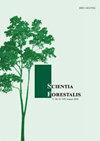种子质量调节木耳鸭苗对水分亏缺的耐受性
IF 0.4
4区 农林科学
Q4 FORESTRY
引用次数: 0
摘要
在半干旱区,长期存在水分亏缺现象,但特有物种的适应机制尚不清楚。本研究的目的是确定木耳鸭(Luetzelburguia auriculata (allem本文章由计算机程序翻译,如有差异,请以英文原文为准。
Seed mass modulates tolerance to water deficit in Luetzelburgia auriculata (Allemão) Ducke seedling
In semi-arid regions, water deficit occurs for long periods, but the adaptation mechanisms developed by endemic species are little known. The objective of this study was to determine the tolerance of Luetzelburguia auriculata (Allemão) Ducke seedlings to water stress regarding germination and seedling establishment related to seeds’ mass. The experiment was conducted in a completely randomized design in a 2 x 5 factorial scheme, with two classes of seeds (ligh t < 0.35 g and heavy ≥ 0.35 g) and five osmotic potential levels (-0.2; -0.4; -0.6; -0.8 and -1.0 MPa), distributed in four replications of 25 seeds per plot. The following parameters were evaluated: germination rate (GR), first germination count (FGC), germination speed index (GSI), mean germination time (MGT), root length (RL), fresh and cotyledon dry mass (CFM/CDM) and fresh and dry root mass (RFM/RDM). As the osmotic potential became more negative, there was a reduction in physiological variables. The h eavy seeds (≥ 0.35 g) showed increases when compared to light seeds (<0.35 g), of 15.73, 22.94, 15.02, 23.33, 31.43, 21.43% for the variables GR, FGC, RL, CFM, CDM and RFM, respectively. Therefore, heavy seeds are more tolerant to water stress and should be prioritized for the recovery of degraded areas, especially in places with low rainfall.
求助全文
通过发布文献求助,成功后即可免费获取论文全文。
去求助
来源期刊

Scientia Forestalis
Agricultural and Biological Sciences-Forestry
CiteScore
1.00
自引率
0.00%
发文量
39
期刊介绍:
Scientia Forestalis is a scientific publication of the IPEF – Institute of Forest Research and Studies, founded in 1968, as a nonprofit institution, in agreement with the LCF – Department of Forest Sciences of the ESALQ – Luiz de Queiroz College of Agriculture of the USP – São Paulo University. Scientia Forestalis, affiliated to the ABEC – Brazilian Association of Scientific Publishers, publishes four issues per year of original papers related to the several fields of the Forest Sciences.
The Editorial Board is composed by the Editor, the Scientific Editors (evaluating the manuscript), and the Associated Editors (helping on the decision of acceptation or not of the manuscript, analyzed by the Peer-Reviewers.
 求助内容:
求助内容: 应助结果提醒方式:
应助结果提醒方式:


